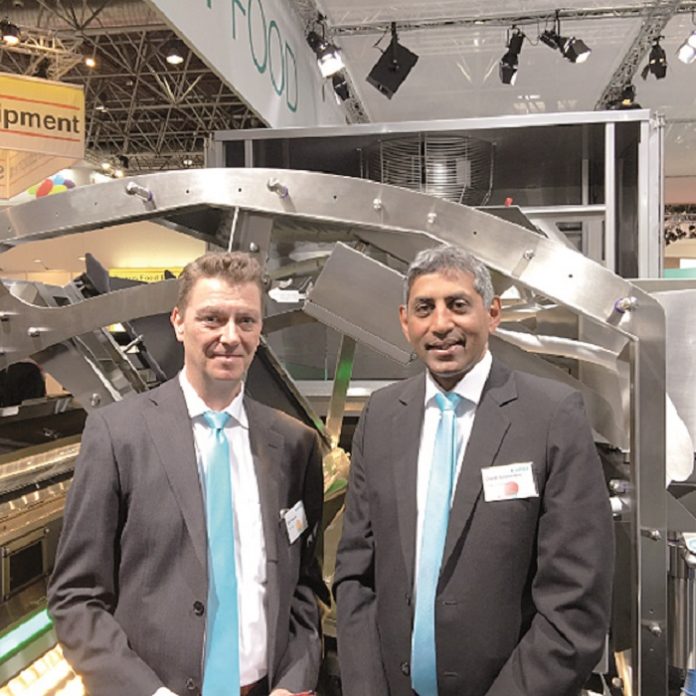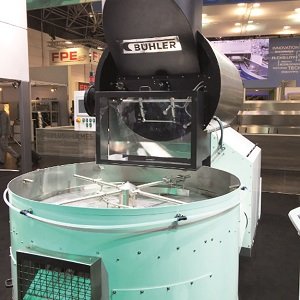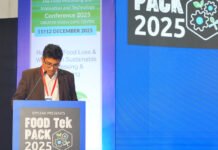
Bühler was, in my experience, the most impressive company at interpack 2017. The family-owned Swiss company is well known in India for its Sortex machines that are used widely for optically sorting rice and other food grains, such as dals (lentils). In addition, the company has been in India since 1992, manufacturing several types of food processing machines for spices and seasoning, brewing and malting, rice and flour milling and raw cocoa bean processing.
 The Bühler 9000: 2001 plant in Attibele near Bengaluru with 650 employees manufactures all except the highest level of drum-type coffee roasting machines. Apart from manufacturing for the Indian and South Asian markets, along with various other food processing equipment, the coffee and cocoa bean roasting machines are exported all over the world. Bühler’s India office also looks after servicing customers in South Asia.
The Bühler 9000: 2001 plant in Attibele near Bengaluru with 650 employees manufactures all except the highest level of drum-type coffee roasting machines. Apart from manufacturing for the Indian and South Asian markets, along with various other food processing equipment, the coffee and cocoa bean roasting machines are exported all over the world. Bühler’s India office also looks after servicing customers in South Asia.
The company’s market presence in India has been growing and the operations have been scaled up considerably in all areas including sales, engineering, services and manufacturing, and the supply network. Besides Bengaluru, Bühler India has offices in Delhi, Pune, Hyderabad, Kolkata and Raipur.

At interpack this year, Bühler created a networking and knowledge environment that could also be described as a food city, complete with its own restaurant. It demonstrated how the use of digital services and IoT technologies offers significant gains in efficiency. “With more intelligent process control, we can further improve productivity and achieve even more consistency in product quality,” said Marco Zappa, head of Business Unit Chocolate Mass at BuÌhler.
Smarter chocolate
High productivity and consistent product quality are important factors to succeed in the industrial production of chocolate. The increasing availability of sensors, actuators, and IoT technologies also open up opportunities for an even more efficient production in this area. At the show, Bühler demonstrated how the ‘Smart Chocolate Factory’ will change the industrial manufacturing of chocolate in the future with more intelligent process monitoring and control for its proven DoMiReCo production line. “Not only will it be possible to increase productivity but also to have more consistency in product quality; and because fewer manual interventions are required, the manufacturing costs will drop, while food safety
will improve,” said Zappa, describing the most important advantages. At interpack 2017, the company also introduced its new molding plant ChocoBotic with robotic technology and its online learning platform—ChocoGenius.
 It was interesting to learn at interpack that Indian chocolate consumption has also been rising quickly although apart from the major global manufacturers, much of the production is still in the artisanal category. However, what makes Bühler interesting is the company’s approach to the issues of health and sustainability. It is aware of, and quite open about, major nutrition and health trends such as the growing epidemic of obesity in many parts of the world as well as the role it can play in areas of malnutrition. The company walks the talk and is seriously committed to efficiencies in the industrial processing and production of food, in knowledge sharing and training with the use of online learning platforms.
It was interesting to learn at interpack that Indian chocolate consumption has also been rising quickly although apart from the major global manufacturers, much of the production is still in the artisanal category. However, what makes Bühler interesting is the company’s approach to the issues of health and sustainability. It is aware of, and quite open about, major nutrition and health trends such as the growing epidemic of obesity in many parts of the world as well as the role it can play in areas of malnutrition. The company walks the talk and is seriously committed to efficiencies in the industrial processing and production of food, in knowledge sharing and training with the use of online learning platforms.










